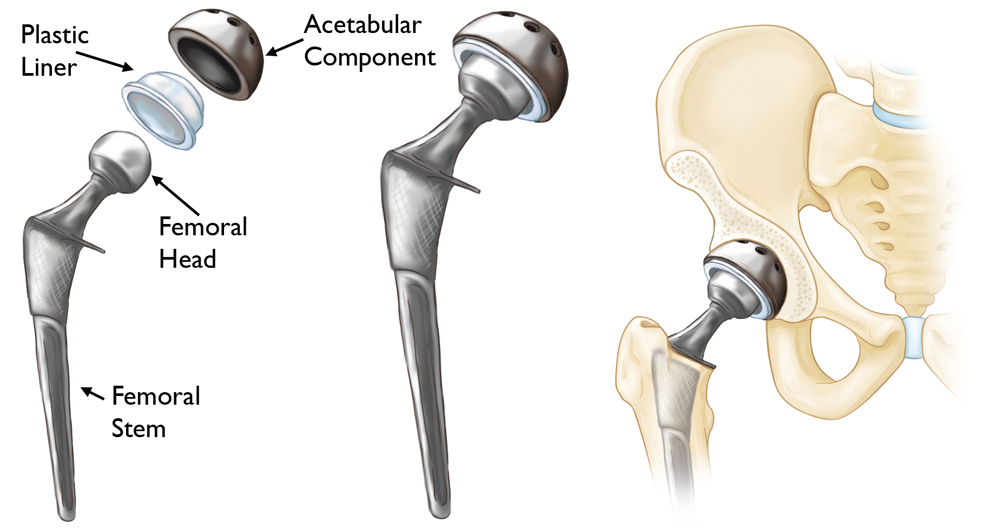Hip Replacement & Revision
Hip replacement surgery is considered when a patient’s hip joint is worn, causing significant pain and reduction in mobility.
Hip Replacement
Is it right for you?
Total hip replacement is considered one of the most successful orthopaedic interventions of its generation, with most people experiencing pain reduction and improvement in their range of movement.
Eligibility depends on the severity of hip damage and it’s impact on daily activities. Common reasons include:
- Osteoarthritis
- Rheumatoid arthritis
- Hip fracture
- Septic arthritis
The damaged hip joint is replaced with an artificial implant. A thorough medical evaluation is required to determine if hip replacement is the right option for you.

Hip Revision
Is it right for you?
Hip revision is the name given to a repeat hip replacement and involves replacing the patient’s current artificial hip joint with a new artificial hip joint.
A hip revision may become an option if your current artificial hip join fails. Hip revisions may also become necessary if your joint has significant wear and tear or if there is an infection or dislocation.
Hip revision surgery can be more complicated and take longer than the original hip replacement surgery. A thorough medical evaluation is required to determine if a hip revision is the right option for you.

Next Steps
Please refer to our FAQ section for more information on this treatment. Or, if you would like to discuss if you are an eligible candidate for hip replacement surgery, please make an appointment with Nuffield Health on call +44 141 530 7354 or by email [email protected].
Recovery Process
The recovery process can vary, but it typically involves:
- Hospital stay: 1-3 days
- Initial mobility: Patients can usually walk with assistance the same day of their operation.
- Physical therapy: Begins straight after surgery and continues for 6–12 weeks.
- Full recovery: 3–6 months for normal activities, but there is clearly a spectrum with some patients regaining function sooner. Function continues to improve up until 2 years after the operation

Before Hip Replacement

After Hip Replacement
Frequently Asked Questions
What are the eligibility criteria for hip replacement surgery?
Eligibility for hip replacement surgery depends on the severity of joint damage and its impact on daily activities. Common criteria include:
- Arthritis (osteoarthritis or rheumatoid arthritis most commonly)
- Joint pain that does not improve with medication or physical therapy
- Limited range of motion and difficulty performing daily tasks
- Joint deformities or fractures causing pain and arthritis
Surgery is typically recommended when arthritis and pain lead to significant loss of function. However, individuals with chronic joint pain without arthritis, arthritis without pain, or joint deformities without pain or arthritis are not usually candidates for surgery.
A thorough medical evaluation is required to determine if hip or knee replacement is the right option for you.
How long is the recovery period after hip replacement surgery?
Recovery periods can vary but typically involves:
- Hospital stay: 1–3 days
- Initial mobility: Patients can usually walk with assistance the same day of their operation.
- Physical therapy: Begins straight after surgery and continues for 6–12 weeks.
- Full recovery: 3–6 months for normal activities, but there is clearly a spectrum with some patients regaining function sooner. Function continues to improve up until 2 years after the operation.
What are the potential risks and complications associated with hip replacement or hip revision surgeries?
Common risks in hip replacement surgeries include:
- Hip dislocation
- Blood clots (deep vein thrombosis) DVT
- Infection
- Different leg lengths
- Damage to soft tissue (muscles, ligaments and tendons) around the joint
- Loosening of the prosthesis
- Fracture medical evaluation is required to determine if knee replacement is the right option for you.
Common risks in hip revision surgeries may include:
- Infection
- Blood clots (deep vein thrombosis) DVT
- Nerve sensitivity or nerve damage
- Implant complications
What are the costs associated with hip replacement surgeries in Glasgow?
The cost of hip replacement surgery in Glasgow varies. Prices depend on the facility and whether they are done privately.
For detailed pricing information, please contact the Nuffield Hospital on 0141 530 7354.
